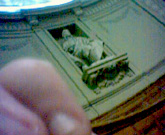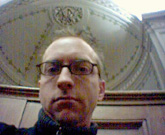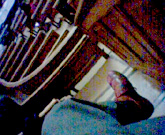- Conference: Programmation Orientée Art
- Speakers: Bernard Stiegler, Charles Sandison, Jean-Pierre Balpe, Olga Goriunova, Matthew Fuller, Andreas Broeckman, Christophe Bruno, Matthew Fuller, Frédéric Madre, Isabelle Vodjdani, Hugues Vient, Richard Kriesche, Gérard Chazal, Woody et Steina Vasulka, Simon Penny, Andre Bernhardt, Paul Devautour, Florian Cramer, Frédéric Durieu, Inke Arns, Geoff Cox, Alex McLean, Robin Fercoq, Stéphane Sautour, Stéphane Sautour, Antoine Schmitt, Douglas Edric Stanley, JODI
- Location: Amphithéâtre de la Sorbonne, Paris
- Date: 19 & 20 March, 2004

Well, that was a catastophe. For me at least. The conference itself was off and on. Some brilliant people — Inke Arns, Andreas Broeckman, the Vasulkas, JODI, Paul Devautour, Alex McLean — but everyone else, most of all the French speakers, seemed to be speaking on a wholly different topic. Pretty much missed the whole train on art & programming. I expected great things from Stiegler, but he didn’t really deliver. That said, he did utter one phrase that risks becoming a mantra in the future: “Pour moi il n’y a pas d’art numérique, mais une période numérique des arts” (hasty translation: ‘I do not believe in a digital art, but rather in a digital period of the arts’).

Anyway, my bit was a total mess, somewhat my own fault for having agreed to what was obviously an attempt to fill in at the last minute an omission. They were a bit embarassed, apparently, to learn from several participants that I’d been working on these subjects for years. Out of politeness I accepted, then, to assuage their embarassement — whereas it probably would have been more polite to decline. When I got there they had reserved a tiny 10 minute time-space at the very end with no real theme, that got squeezed down to about 5 minutes because we were going to be kicked out of the room. One of the organisers insisted that I show some of my own work in that time-frame, which created a small plug-in-the-computer-quickly fiasco, meanwhile someone in the audience screams out once I’ve started, “who is this guy?” They had forgotten to present me. Who’s that freak at the mic? …utterly useless to even show up in such circumstances. A bit pissed at the whole thing, I ended up rambling some incoherent, agressive rant, apparently — since I can’t remember what it is I said.
At least I remember what I tried to say. Inke Arns had really got it right for me, when she showed a brilliant piece from an engineer who generated music by slightly modifying the scan frequency of a computer monitor and placing a little radio next to the monitor. It was probably one of the best pieces shown in the two-day conference, and not even by an artist. So in response to this, I brought back up the concept for a conference title I had created way back in February 2001: CODE|ART. One of the ideas in that title for me was both the separation of the two terms, i.e. the fact that they’re not the same thing. But additionaly, in the title we could also read the function of the Unix Pipe, in which the output of one process (here CODE) inputs into another process (ART). Arne’s example was a perfect illustration of this situation in which an object not built in an artistic context, becomes extremely interresting in an artistic context.
And finally, the same phrase, CODE|ART, can be re-read, if we were to program it in C code, or in Java, to be a biwise operator that would take the zeros and ones of CODE and mix them with the zeros and ones of ART to make a new term. So what, in a first reading, is an exclusive opposition, eventually becomes a hybrid term. This term can even be processed in the computer and given a name. Using some bitwise-friendly language, we can calculate the result of ‘CODE’ | ‘ART’ as ‘C_TE’, or ‘cte’ if you calculate using lowercase letters.
I was trying, through this argument, to answer a mini-debate that was brewing in the halls of the conference for and against the need to define what programmed art is. I suppose I was just trying to strike a balance between the two tendencies. But since my microphone was cut off (at least symbolically), I couldn’t really get to this point. The last time I was ousted off the mic like that, it was by the president of Vivendi of all people (it figures). That too was a 10-minute, turned 5-minute, affair. Ho hum.

